Rochelle Anderson Teeny
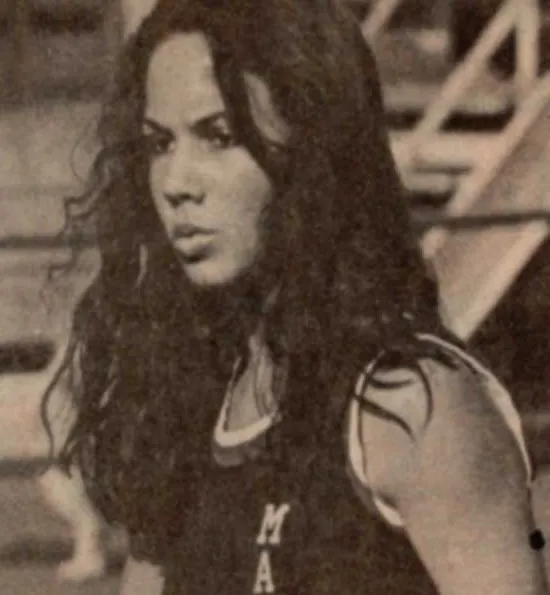

Given her druthers, Loretta Anderson would have chosen satin and tulle and tiaras over singlets and spikes and sweats as the attire of record for her youngest daughter. But it’s not as if Rochelle Anderson Teeny (Marshall, 1979) hadn't made an effort to indulge her mother’s wishes.
Fourteen years of ballet lessons is just one of the many concessions Rochelle made that indicates she sure gave Mom's aspirations for her more than just the ol' college try.
Shoot, given the competing influences at play in the Anderson’s Mt. Tabor household in Rochelle’s formative years – besides Mom, there was an older brother setting Marshall pole-vault records and an older sister giving the school its first-ever Rose Festival Queen -- it’s a wonder she didn’t run off in an entirely different direction altogether. Maybe decide to become a satellite engineer or an airplane pilot or a Ham radio operator or, who knows, a person who can take her friends to dinner at Kachka and tell them what the actual heck “chikufta” is without having to read the menu description.
OK, sure, as it turned out, Rochelle did do all that (except maybe the Kachka thing; that was a shot in the dark. The point was, she learned to speak Russian, too). But she didn’t do any of it until after she spent all those years in a tutu and after she also became a track star and a lot more.
Whoever said you can’t please everyone clearly was a quitter, because Rochelle Anderson Teeny sure did it successfully and, fortunately, that includes herself. While she preferred sports thrills to dance frills, she still walked in her sister’s high-heeled footsteps all the way onto the Rose Festival Court, making the Anderson girls the first and still only set of sisters to become Queen. And not only did she dance ballet, but she sang and acted, and since it should be obvious by now she’s capable of speaking for herself, in more than one language, it’s time she did.
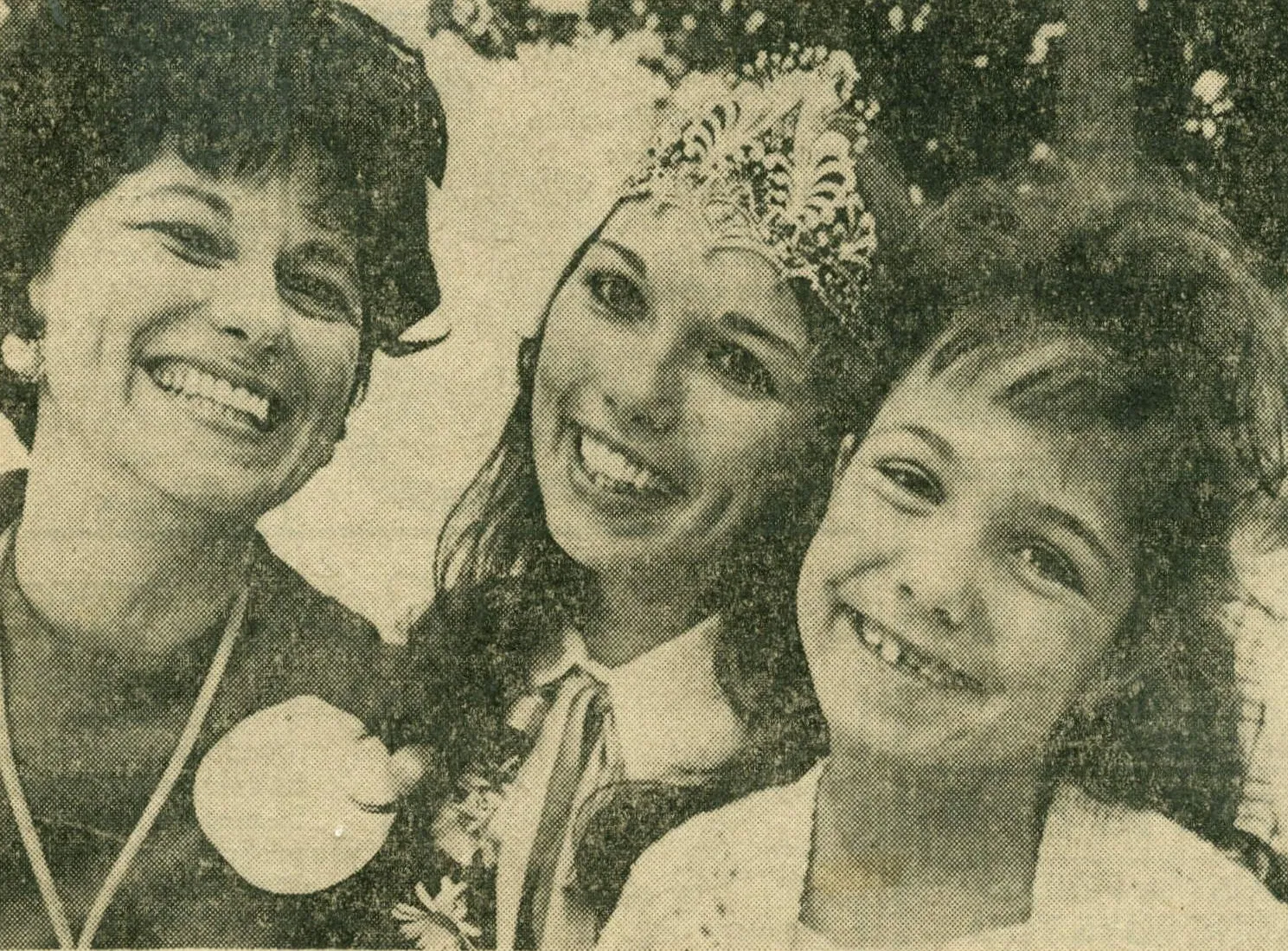
“So, I was the baby of the family,” she starts. “My sister, Rhonda, who was 10 years older, was Rose Festival Queen and went on to become Miss Portland. She was in all sorts of dance contests and pageants, and Mom was trying to get me to do the same thing. So, I took lessons in ballet and music and singing and was in lots of plays. But I also had two older brothers, Don and Ron, who were both pretty good athletes. Donnie, the oldest, played basketball, and Ronnie set a Marshall pole-vaulting record. So, I was also a bit of a tom boy.”
Despite that, Mom was undeterred, and she was getting plenty of help from outsiders. “Ever since second grade, I was hearing, ‘Are you going to be a Rose Festival Queen like your sister?’ I just wanted the Rose Festival to go away,” Rochelle recalls with a laugh. “At that time, Benson boys were the ones who drove the Rose Festival court all around. My dad was the service manager at a Ford dealership, so I was always around cars, and I was more interested in being one of those Benson drivers when I got old enough.”
Off and Running
Rochelle was in third grade when she learned she had a particular athletic skill that might pay off for her, and for a brief moment it did literally.
“There was a boy named Jimmy Gentry, who was a pretty fast runner,” she remembers. “Another kid bet me that I couldn’t beat Jimmy, so we had a race. I won, and the kid paid me a dollar or two or whatever it was. A day or two later, his mom marched him down to my house and I had to give him back his money.”
But that lit a spark, and by the time Rochelle was in middle school, Don Sr. was entering his daughter in AAU track meets (a possible indication that, when it came to visions for their daughter, the folks may not have been seeing eye to eye). During one eighth-grade meet, Marshall track coach Chet Greene approached Rochelle and suggested she join his team once she hit Marshall.
“I said, ‘Sure,’” she remembers.
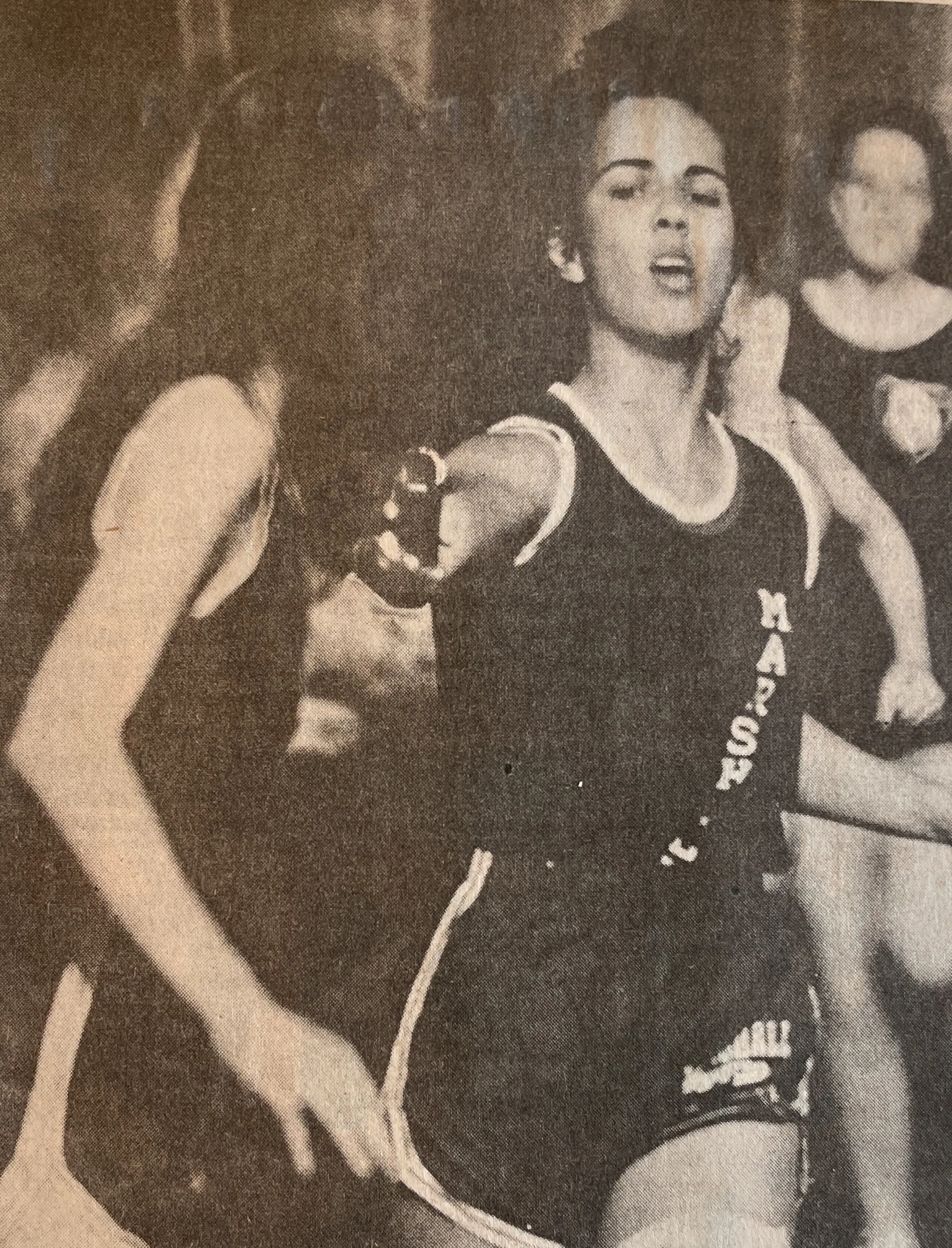
Greene clearly had an eye for talent. As a freshman, Rochelle won the 440 in the PIL Championships in a city-record 57.6 and ran legs on Marshall’s 4x110 and 4x440 relay teams that also won PIL titles before taking second at state in both events. The Minutemen’s 4x110 team repeated the feat at state the next year. In Rochelle’s senior year, she and her teammates won the 800 PIL championship in a school-record time.
Looking back on her experience growing up, Rochelle surmises that her mother’s efforts to turn her into a dancing queen may have had the opposite effect.
“Because I did all that ballet training, I probably had better quad muscles and leg strength than your average kid,” she says. “Mom may have inadvertently turned me into a track athlete.”
Rochelle says her mother took the news she was going to focus on athletics in stride, even though it meant her plans for her daughter were being dashed.
“She just shook her head when I told her I was giving up ballet; she told me I should have been a hippie,” Rochelle remembers with a laugh. “But she was great; she totally supported me in everything I did.”
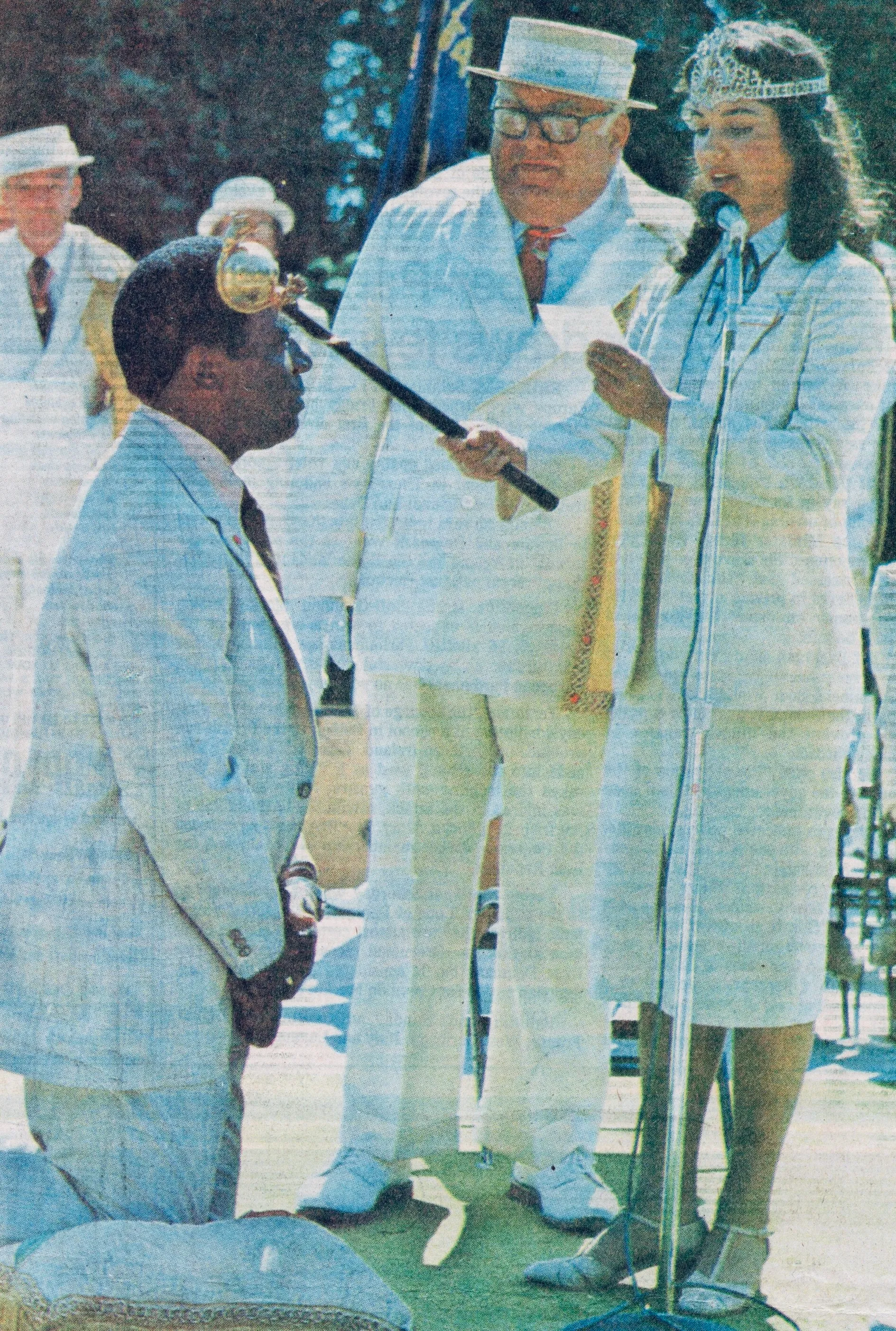
Rochelle made that pretty easy for Mom when she was crowned Queen of Rosaria, making her and Rhonda the only two Marshall students to ever earn the title. (A couple decades later, Rochelle’s daughter would become Central Catholic’s Rose Festival princess.)
Up, Up and Away
In addition to running track at Marshall, Rochelle joined the school’s first soccer team when she was a junior and enjoyed enough success that she considered pursuing that sport at Oregon State. But somewhere along her childhood path she got bitten by a bug from outer space.
“I wanted to be an astronaut; I wanted to work at NASA. It may have been because I watched a lot of ‘I Dream of Jeanie,’ which was always showing rocket launches,” Rochelle cracks.
So, after spending a year at Portland State to take advantage of the one-year scholarship that came with being Rose Festival Queen, she set out for San Jose State. After earning a degree in physics and math, Rochelle was hired as a satellite engineer at Lockheed Missiles and Space Co.
“I worked in a building called the Blue Cube. All the nation’s spy and communications satellites were operated out of that building. It was just like those movies where a bunch of guys are sitting in rows looking at monitors, watching data sent down from satellites.”
One of those guys happened to be a flight instructor, who taught Rochelle how to fly. With a private pilot’s license in hand, she considered becoming a commercial airline pilot until learning “my eyesight wasn’t sharp enough to meet vision requirements.”
Rochelle sums up the ensuing several years in one succinct swoop that covers a spectrum of emotions: “I got married to my husband, George, moved back to Portland, raised three kids, took care of my mom, who had cancer, until she passed away, then took care of my sister for 20 years after she was diagnosed with multiple sclerosis until she passed away. My brother, Ronnie, was diagnosed with schizophrenia when I was at Marshall. He was my personal track coach and we were very close, and during the last 10 years of his life, I was his legal guardian and caregiver.”
Not that it needed to be said, but Rochelle says it anyway. “Family comes first.”
No Place Like Home
That becomes even more apparent when she adds that she now lives in the same Mt. Tabor home her dad built for the Anderson family in 1967, along with one of her sons, Zach (a Naval Academy graduate and now a captain in the Oregon National Guard), his wife and their little boy.
Her second son, Jake, an assistant professor in marketing at Northwestern University’s Kellogg School of Management, lives in Chicago with his wife and two girls, and her daughter, Rhonda, is a self-employed project manager.
“Every day I am so thankful for everything I have,” Rochelle says. “There are no words to describe it.”
.webp)
That’s saying something considering she has words from three languages at her disposal. Rochelle had always wanted to learn a second language, so she took four years of Russian at Portland Community College and Portland State, growing her skills by also working with a tutor who became a good friend.
“I speak Russian with her every day,” Rochelle says. “I’m not at the U.N. level but I can keep up.”
She also learned sign language so she could communicate better with a hearing-impaired sister-in-law and her husband.
And, as if she didn’t have enough ways to communicate with others, there’s that antenna towering over Rochelle’s house. She got interested in the hobby after taking an earthquake preparedness class at Portland State and learning how important Ham radio operators are in replacing or augmenting communication efforts during natural disasters. Rochelle got her Ham radio operator’s license and is now a volunteer for the Multnomah County Amateur Radio Emergency Services.
In a life filled with highlights, Rochelle considers her 2020 induction into the PIL Hall of Fame one of the most meaningful.
“Oh, my goodness, when I learned about it I was just shocked and thrilled,” she says “I love the PIL with all my heart and soul. Back in high school, I was clipping any article written about Marshall or the PIL out of The Oregonian and The Journal. It was a great feeling to be part of that, and to have done well. I loved competing with or against some of the people in the hall of fame. So to be part of it now is right up there with being Rose Festival Queen as one of the biggest honors in my life.”
Somewhere, Mom and Dad and brother and sister are all smiling.
Do you know Rochelle Anderson-Teeny? If you'd like to reconnect, she can be reached at rogini17@gmail.com
For profile comments or suggestions for future profile subjects, contact Dick Baltus: ralanbaltus@gmail.com
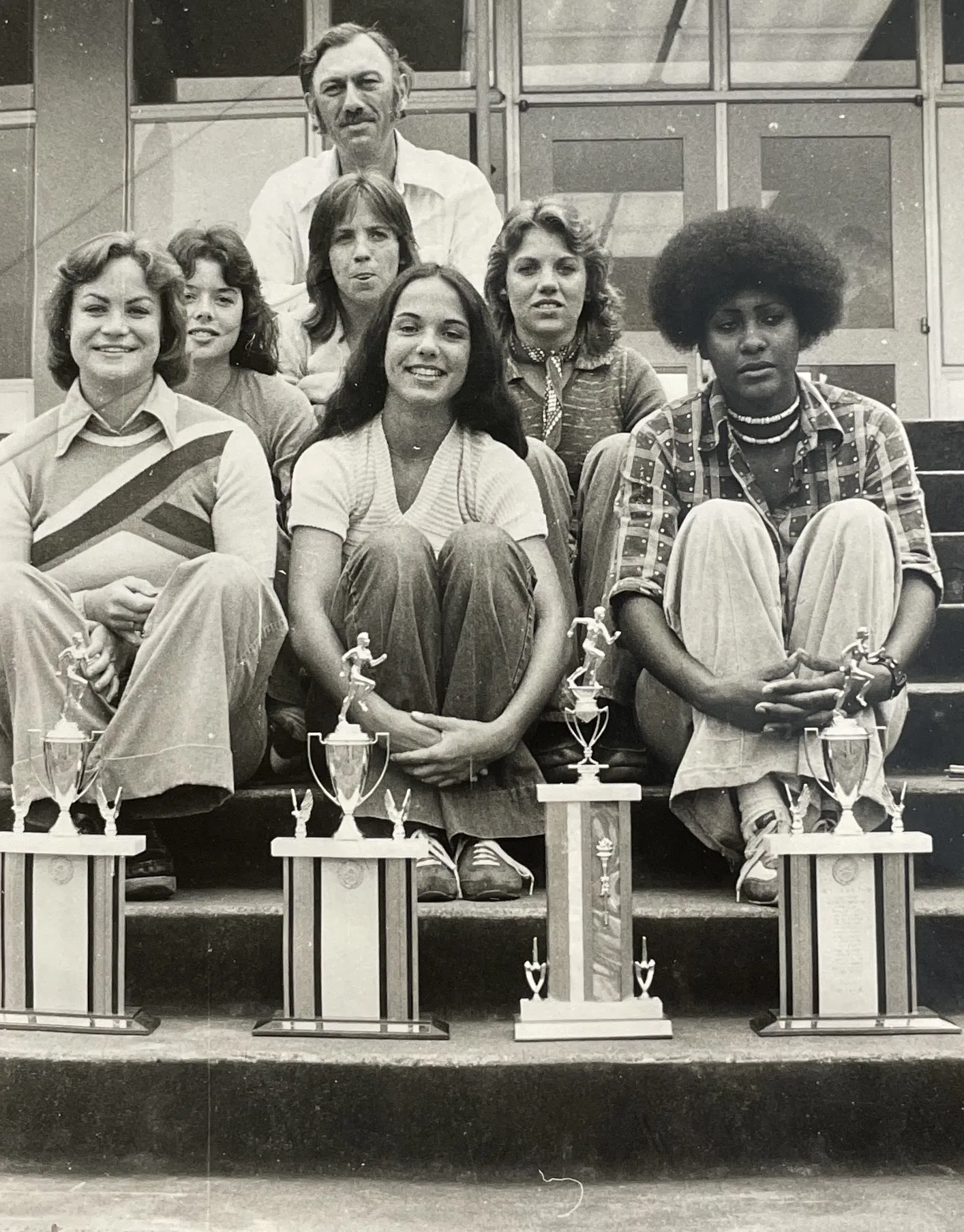
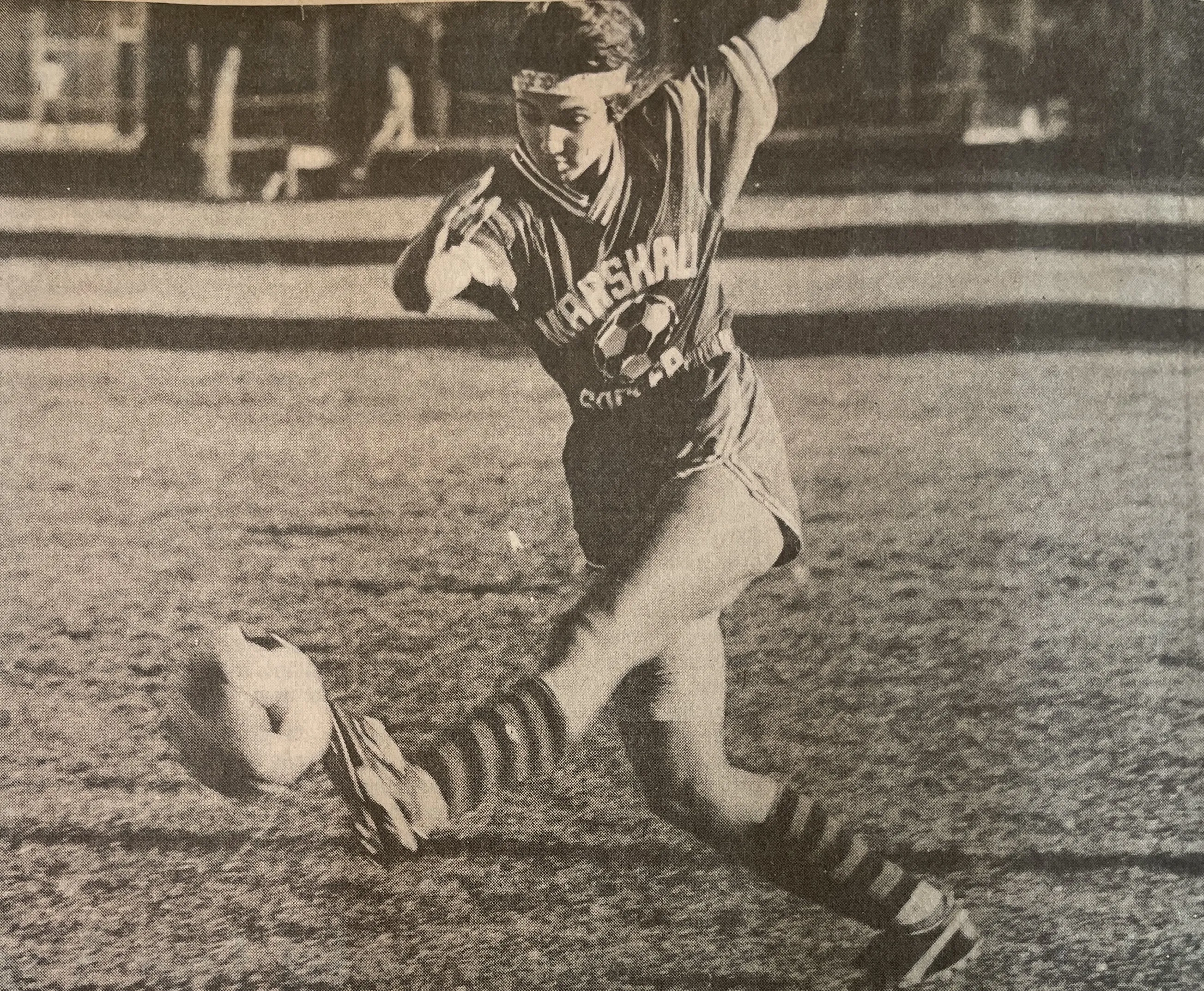

%202.webp)
.webp)
Member Spotlight
Given her druthers, Loretta Anderson would have chosen satin and tulle and tiaras over singlets and spikes and sweats as the attire of record for her youngest daughter. But it’s not as if Rochelle Anderson Teeny (Marshall, 1979) hadn't made an effort to indulge her mother’s wishes.
Fourteen years of ballet lessons is just one of the many concessions Rochelle made that indicates she sure gave Mom's aspirations for her more than just the ol' college try.
Shoot, given the competing influences at play in the Anderson’s Mt. Tabor household in Rochelle’s formative years – besides Mom, there was an older brother setting Marshall pole-vault records and an older sister giving the school its first-ever Rose Festival Queen -- it’s a wonder she didn’t run off in an entirely different direction altogether. Maybe decide to become a satellite engineer or an airplane pilot or a Ham radio operator or, who knows, a person who can take her friends to dinner at Kachka and tell them what the actual heck “chikufta” is without having to read the menu description.
OK, sure, as it turned out, Rochelle did do all that (except maybe the Kachka thing; that was a shot in the dark. The point was, she learned to speak Russian, too). But she didn’t do any of it until after she spent all those years in a tutu and after she also became a track star and a lot more.
Whoever said you can’t please everyone clearly was a quitter, because Rochelle Anderson Teeny sure did it successfully and, fortunately, that includes herself. While she preferred sports thrills to dance frills, she still walked in her sister’s high-heeled footsteps all the way onto the Rose Festival Court, making the Anderson girls the first and still only set of sisters to become Queen. And not only did she dance ballet, but she sang and acted, and since it should be obvious by now she’s capable of speaking for herself, in more than one language, it’s time she did.

“So, I was the baby of the family,” she starts. “My sister, Rhonda, who was 10 years older, was Rose Festival Queen and went on to become Miss Portland. She was in all sorts of dance contests and pageants, and Mom was trying to get me to do the same thing. So, I took lessons in ballet and music and singing and was in lots of plays. But I also had two older brothers, Don and Ron, who were both pretty good athletes. Donnie, the oldest, played basketball, and Ronnie set a Marshall pole-vaulting record. So, I was also a bit of a tom boy.”
Despite that, Mom was undeterred, and she was getting plenty of help from outsiders. “Ever since second grade, I was hearing, ‘Are you going to be a Rose Festival Queen like your sister?’ I just wanted the Rose Festival to go away,” Rochelle recalls with a laugh. “At that time, Benson boys were the ones who drove the Rose Festival court all around. My dad was the service manager at a Ford dealership, so I was always around cars, and I was more interested in being one of those Benson drivers when I got old enough.”
Off and Running
Rochelle was in third grade when she learned she had a particular athletic skill that might pay off for her, and for a brief moment it did literally.
“There was a boy named Jimmy Gentry, who was a pretty fast runner,” she remembers. “Another kid bet me that I couldn’t beat Jimmy, so we had a race. I won, and the kid paid me a dollar or two or whatever it was. A day or two later, his mom marched him down to my house and I had to give him back his money.”
But that lit a spark, and by the time Rochelle was in middle school, Don Sr. was entering his daughter in AAU track meets (a possible indication that, when it came to visions for their daughter, the folks may not have been seeing eye to eye). During one eighth-grade meet, Marshall track coach Chet Greene approached Rochelle and suggested she join his team once she hit Marshall.
“I said, ‘Sure,’” she remembers.

Greene clearly had an eye for talent. As a freshman, Rochelle won the 440 in the PIL Championships in a city-record 57.6 and ran legs on Marshall’s 4x110 and 4x440 relay teams that also won PIL titles before taking second at state in both events. The Minutemen’s 4x110 team repeated the feat at state the next year. In Rochelle’s senior year, she and her teammates won the 800 PIL championship in a school-record time.
Looking back on her experience growing up, Rochelle surmises that her mother’s efforts to turn her into a dancing queen may have had the opposite effect.
“Because I did all that ballet training, I probably had better quad muscles and leg strength than your average kid,” she says. “Mom may have inadvertently turned me into a track athlete.”
Rochelle says her mother took the news she was going to focus on athletics in stride, even though it meant her plans for her daughter were being dashed.
“She just shook her head when I told her I was giving up ballet; she told me I should have been a hippie,” Rochelle remembers with a laugh. “But she was great; she totally supported me in everything I did.”

Rochelle made that pretty easy for Mom when she was crowned Queen of Rosaria, making her and Rhonda the only two Marshall students to ever earn the title. (A couple decades later, Rochelle’s daughter would become Central Catholic’s Rose Festival princess.)
Up, Up and Away
In addition to running track at Marshall, Rochelle joined the school’s first soccer team when she was a junior and enjoyed enough success that she considered pursuing that sport at Oregon State. But somewhere along her childhood path she got bitten by a bug from outer space.
“I wanted to be an astronaut; I wanted to work at NASA. It may have been because I watched a lot of ‘I Dream of Jeanie,’ which was always showing rocket launches,” Rochelle cracks.
So, after spending a year at Portland State to take advantage of the one-year scholarship that came with being Rose Festival Queen, she set out for San Jose State. After earning a degree in physics and math, Rochelle was hired as a satellite engineer at Lockheed Missiles and Space Co.
“I worked in a building called the Blue Cube. All the nation’s spy and communications satellites were operated out of that building. It was just like those movies where a bunch of guys are sitting in rows looking at monitors, watching data sent down from satellites.”
One of those guys happened to be a flight instructor, who taught Rochelle how to fly. With a private pilot’s license in hand, she considered becoming a commercial airline pilot until learning “my eyesight wasn’t sharp enough to meet vision requirements.”
Rochelle sums up the ensuing several years in one succinct swoop that covers a spectrum of emotions: “I got married to my husband, George, moved back to Portland, raised three kids, took care of my mom, who had cancer, until she passed away, then took care of my sister for 20 years after she was diagnosed with multiple sclerosis until she passed away. My brother, Ronnie, was diagnosed with schizophrenia when I was at Marshall. He was my personal track coach and we were very close, and during the last 10 years of his life, I was his legal guardian and caregiver.”
Not that it needed to be said, but Rochelle says it anyway. “Family comes first.”
No Place Like Home
That becomes even more apparent when she adds that she now lives in the same Mt. Tabor home her dad built for the Anderson family in 1967, along with one of her sons, Zach (a Naval Academy graduate and now a captain in the Oregon National Guard), his wife and their little boy.
Her second son, Jake, an assistant professor in marketing at Northwestern University’s Kellogg School of Management, lives in Chicago with his wife and two girls, and her daughter, Rhonda, is a self-employed project manager.
“Every day I am so thankful for everything I have,” Rochelle says. “There are no words to describe it.”
.webp)
That’s saying something considering she has words from three languages at her disposal. Rochelle had always wanted to learn a second language, so she took four years of Russian at Portland Community College and Portland State, growing her skills by also working with a tutor who became a good friend.
“I speak Russian with her every day,” Rochelle says. “I’m not at the U.N. level but I can keep up.”
She also learned sign language so she could communicate better with a hearing-impaired sister-in-law and her husband.
And, as if she didn’t have enough ways to communicate with others, there’s that antenna towering over Rochelle’s house. She got interested in the hobby after taking an earthquake preparedness class at Portland State and learning how important Ham radio operators are in replacing or augmenting communication efforts during natural disasters. Rochelle got her Ham radio operator’s license and is now a volunteer for the Multnomah County Amateur Radio Emergency Services.
In a life filled with highlights, Rochelle considers her 2020 induction into the PIL Hall of Fame one of the most meaningful.
“Oh, my goodness, when I learned about it I was just shocked and thrilled,” she says “I love the PIL with all my heart and soul. Back in high school, I was clipping any article written about Marshall or the PIL out of The Oregonian and The Journal. It was a great feeling to be part of that, and to have done well. I loved competing with or against some of the people in the hall of fame. So to be part of it now is right up there with being Rose Festival Queen as one of the biggest honors in my life.”
Somewhere, Mom and Dad and brother and sister are all smiling.
Do you know Rochelle Anderson-Teeny? If you'd like to reconnect, she can be reached at rogini17@gmail.com
For profile comments or suggestions for future profile subjects, contact Dick Baltus: ralanbaltus@gmail.com



%202.webp)
.webp)
More On This Hall of Famer
Read about their career and accomplishments on their HoF profile page.
Other Featured Members
We have a catalog of dozens of featured members of the month.
